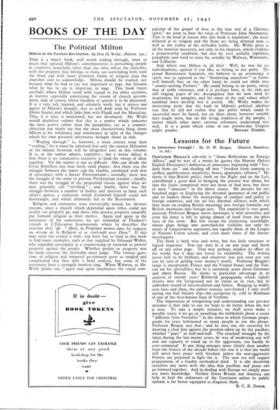BOOKS OF THE DAY
The Political Milton
Milton in the Puritan Revolution. By Don M. Wolfe. (Nelson. 25s.)
Tins is a timely book, well worth wading through, since so much that agitated Milton's contemporaries is perturbing people in countries, mercifully other than our own, where the churches, with the property that belongs to them, are contending both with the State and with more primitive forms of religion than the churches care to acknowledge. Milton should be studied, not because what he had to say was important in 1641, but because what he has to say is important in 1941. This book traces carefully where Milton stood with regard to the other sectaries, in matters especially concerning the reason of church govern- ment, and, of course, where freedom of speech is to be discussed. It is a very full, learned, and scholarly work, but it misses one aspect of Milton's thought, that so well dealt with by Professor Denis Saurat, and which links him with Fludd and the Mortalists. This, it is true, is mentioned, but not developed. Mr. Wolfe would doubtless submit that this is a matter which concerns the later poetry rather than the pamphlets, yet as a counter- objection one might say that the most characteristic thing about Milton is his wholeness and consistency in spite of the changes which his own personal adventures brought about in him.
" Wading through " is, however, a more correct term than " reading," for it must be admitted that only the earnest Miltonian or the minute historian will be altogether easy in this volume. It is, as the author admits, repetitive ; but a worse defect is that there is no consecutive narrative to bind the sweep of ideas together. Yet the matter is not so difficult. One can divide the Great Rebellion into four fairly valid phases: first there was the struggle between the taxers and the taxable, combined with that of episcopacy with a fiercer Protestantism ; secondly, there was the struggle of the army to prevent Presbyterian tyranny ; thirdly, there was the struggle of the propertied classes against what we may generally call " levelling " • and, finally, there was the struggle between a number of bodies and interests to limit each other's power, a confusion which Cromwell himself could not disentangle, and which ultimately led to the Restoration.
Religion and economics were inextricably mixed, for obvious reasons, since a church which depended upon tithes could not readily see property go, and those who possess property naturally put forward religion as their motive. Again and again in the utterances of the contestants we are reminded of Flaubert's remark in L'Education Sentimentale where he describes the reaction after '48. "Alor;, la Propriete monta dans les respects au niveau de la Religion et se confondit avec Dieu." If this may seem too cynical a view, you have but to read in this book to find many examples, such as that supplied by Edmund Waller, who regarded episcopacy as a counterscarp or outwork to- protect property against the people. Whether prelaty or property was his main concern, the charitable must judge. The various ques- tions of religion and temporal government grew so tangled and complicated that they defy a brief analysis, but some of the utterances have a strangely modern ring. When Walwyn, as Mr. Wolfe points out, " again and again emphasises the social corn- pulsion of the gospel of love as the true test of a Christian spirit," we seem to hear the voice of Professor John Macmurray. That is the kind of reason why this book is important ; the issues debated as to religion and the State are being debated now, as well as the reality of the orthodox faiths. Mr. Wolfe gives us all the material necessary, not only in his chapters, which evidence a praiseworthy erudition, but also by very usefully reprinting pamphlets now hard to come by, notably by Walwyn, Winstanley, and Lilburne.
And where was Milton in all this? Well, he was far too individualistic, egoistic if you like, to belong to any party. The proud Renaissance humanist, the believer in an aristocracy of spirit, was as opposed to the " Switzering anarchists " as Crom- well himself, but, on the other hand, he could not abide your " canary-sucking Prelates." He could belong to no party, except that of noble tolerance, and it is perhaps here, in the rich and still ringing pages of the Areopagitica that we now need his inspiration, his integrity, and his sense of the real values which mankind must develop lest it perish. Mr. Wolfe makes the interesting point that the fault in Milton's political idealism was that he did not realise that any polity which could be successful must be based, not on ideas alone, however sensible they might seem, but on the living traditions . of the people, a matter which other more extreme reformers understood very well. It is a point which some of our present-day Utopists


























 Previous page
Previous page